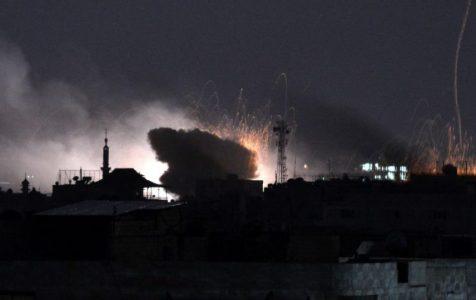
What’s left for the Islamic State terrorist group in the Middle East?
The Islamic State militant group (ISIS) has reportedly agreed to surrender its only stronghold south of Damascus, but the Syrian military and its allies continue to battle the jihadis as the two sides attempt to negotiate the return of the neighborhoods to the Syrian government.
The Syrian Observatory for Human Rights—a U.K.-based monitor supportive of Syria’s beleaguered opposition—first reported Thursday that ISIS militants had agreed to give up the southern capital neighborhoods of Yarmouk Camp, Al-Qadam, Al-Hajar Al-Aswad and Al-Tadamon, following a violent pro-Syrian government offensive. Fighting continued through the weekend, however, as the activist group said negotiations over when to implement the evacuation remained underway between ISIS, the government and Russian intermediaries supportive of Syrian President Bashar al-Assad.
The Syrian military and its allies, including the pro-government National Defense Forces, have pledged to continue fighting until the jihadis expressed “total seriousness in committing to the agreement,” the observatory reported Monday. As the jihadis appeared poised to fall near Damascus, however, a thinning list of territories elsewhere put the group’s very existence at risk.
Rebels in the neighboring villages of Yalda, Babbila and Beit Sahem have already agreed to either reconcile with the government or relocate to other insurgent-held territories, but an ISIS surrender was much rarer. The jihadis cut deals following losses last summer to Lebanese, Syrian and Hezbollah campaigns in eastern Lebanon and western Syria as well as a U.S.-backed Syrian Democratic Forces offensive in Raqqa in October, but have been known to fight to the death to defend their self-proclaimed ultraconservative caliphate, as they did in Iraq’s second city of Mosul.
Since controlling about half of Iraq and Syria at its height in 2014, ISIS has lost about 90 percent of its territory to a pro-Syrian government campaign, backed by Russia and Iran, and the U.S.-led coalition, which supported the Syrian Democratic Forces. The jihadis have lost nearly all their land in Iraq and coalition spokesman Ryan Dillion said Tuesday that they remained confined to two pockets in Syria, “near the Hajin, which is along the Euphrates River, north of Al-Bukamal; and in Al-Dashisha, near the Syria-Iraq border.”
Source: Newsweek





